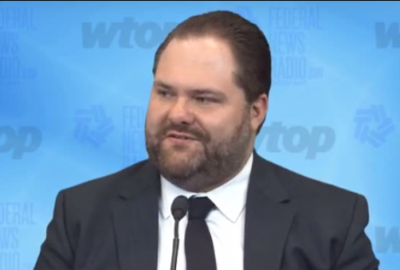The Education Department won’t go away, but it will change under Trump
Don't look for the Education Department to disappear after the next Trump administration assumes office. But it's likely to undergo fairly drastic change.
Don’t look for the Education Department to disappear after the next Trump administration assumes office. It won’t have enough votes in Congress. Still, the department is likely to undergo fairly drastic change. Rick Hess, the director of education policy at the conservative American Enterprise Institute, joined The Federal Drive with Tom Temin with some predictions.
Interview transcript:
Tom Temin: And you’ve written, of course, that the votes aren’t there, even if there was the inclination to eliminate the department. So given that it’s going to be some type of education department, what are your top predictions for how it might change?
Rick Hess: The biggest concern among folks in the education space is that some of the specific funding streams are going to go away. Title I for schools serving low income kids, special education funds, Pell Grants. The reality is none of these are likely to see major cuts mostly because Democrats want to increase them. And when given a chance to cut them in the past, most Republicans would prefer not to. They don’t really want to take funding away from families with special needs children or from schools serving low income kids. What’s likely to change is the way the Civil Rights Division is dealing with schools and colleges on issues of race and gender. What’s likely to change is the way accreditation works in higher education and certainly what’s likely to change as the way the Biden administration has been trying to shift the cost from student loans from borrowers to taxpayers.
Tom Temin: Right. On the issue of the communication with school districts and with higher education institutions that get public money, during the Obama administration, there were policy letters called Dear Colleague, and they got a lot of controversy over some of the socio types of things that administration I guess the Biden one also wanted from educational establishments. Talk about some of those and how that could change.
Rick Hess: Sure. So what the Obama administration pioneered was the strategy of taking extremely loose language and decades-old federal legislation, say Title IX, which dealt with the way that campuses and schools had to make sure that women were treated equally and had harassment, free educational environments. And the Office of Civil Rights used that to radically overhaul the way colleges were expected, for instance, to deal with accusations of sexual harassment. They forced colleges through litigation and investigation to dramatically drop the evidentiary bar for what they could use in order to hold that somebody was actually guilty. They did away with the right to confront of the accused to confront their accuser. They created essentially the star chamber hearing processes and wound up with hundreds of sexual harassment suits being overturned in federal courts because it appeared that innocent alleged perpetrators had actually not done what they were accused of, but that they had not gotten justice on campus. One of the most famous, not an Obama instance, but one that folks might remember was the Duke lacrosse team being shamed to being ridiculed. Some of them had to change their names and it turned out they actually hadn’t done what they were accused of. This is an example of kind of the power of the Office of Civil Rights to the Department of ED to go after colleges under loose language. The Biden and Obama administrations have done similar things with school discipline when it comes to requiring almost racial proportionality and kids being disciplined. The Biden administration has certainly done it with guidance around how schools must address transgender issues when it comes to sports teams or locker rooms. And what you can expect is that the Trump administration this time is going to use those levers in a fundamentally different way. They didn’t last time because Betsy DeVos was more of a traditional small government conservative. But you can expect something real different this time out of the gate.
Tom Temin: Yeah, that implies that this time the administration in general will populate agencies. I guess it seemed as if they didn’t really understand the last time around what it takes to have these kinds of initiatives happen at an agency one side or the other. And the Democrats are better at this, again, without saying who’s right or wrong. But you have to embed the agencies with people that are going to effectuate the policies you want. That seems more likely this time around?
Rick Hess: Yeah, for two reasons. One, the bench just wasn’t there last time. When they were trying to staff up under Betsy DeVos, you just did not have a bench of conservative attorneys who were interested in using the federal government to fight these culture wars in the same way you do today. Today, after school closures, after the CRT fights, after the transgender fights of the last 5 or 6 years. You now have a raft of organizations and young attorneys who are eager for the chance to fight these fights.
Tom Temin: We’re speaking with Rick Hess, director of education policy at the American Enterprise Institute. And you’ve also written that the student loan program can’t go away because there’s a trillion and a half-dollar, I think it’s about. $1.5 trillion in outstanding loans, but that could easily be that and other functions taken over by other departments that are more logically aligned with the specific function.
Rick Hess: Yeah. So, for instance, when there’s talk of abolishing the department, as you know that the Republicans don’t have the votes, you would need 60 votes to overcome a filibuster on this. You can’t abolish the department through reconciliation. But even the bill that my Sen. Mike Rounds introduced to abolish the department, it wouldn’t make all of that functions go away. What the bill would do is reassign. So the student loan portfolio, for instance, would presumably be reassigned to Treasury, which actually makes a lot more sense. There are people at Treasury who have far more experience and much better relationships to manage a trillion plus in outstanding debt. What the Biden administration has done is they have created a policy of quote, unquote, loan forgiveness, which they have repeatedly tried to use loose federal language to justify the secretary of education telling borrowers, ‘Yeah, you’re good, don’t pay back taxpayers. They’ll pick it up.’ That’s likely very likely to no longer be the case. But after several years of this, you have real confusion about what folks owe. you’ve got people who’ve not made a payment in several years. You’ve got a loan collection apparatus that is in disarray. So the challenge for the new secretary of education or for whoever oversees the portfolio is going to be how do you get those repayment schedules back up and running? How do you get borrowers to understand that they have to make those payments? And how do you do it in a fair minded way that doesn’t breed distrust or anger?
Tom Temin: All right. And then you mentioned earlier the functions of social policy, let’s say, in education. And I think you’re suggesting that might be in the Justice Department’s Civil Rights Division because it’s the same topic as in every other institution or domain of public life.
Rick Hess: Yeah. One of the frustrations that you’ve heard from the incoming Trump team is, again, this adventurism that you saw at the Office of Civil Rights at the Department of ED under Obama and Biden. One way to limit that future adventurism is by having that Office of Civil Rights operate less like cowboys in the education arena and more at the Department of Justice where there are stronger standards, stronger norms, a stronger professional culture of how do you oversee and exercise this kind of civil rights litigation.
Tom Temin: And I guess if the Education Department kept, say, some of the granting power that it has, that could also be a mechanism by which the differing policies that Trump wants could be effectuated by how you operate grant programs.
Rick Hess: Yeah. The majority of the federal grants for K-12 and it’s important for listeners to understand that this is really the tail of the department. The big part of the department is the student loans and the Pell Grants really helping folks pay for college. There’s about $15 billion a year in Title I for schools serving low income kids. There’s about $18 billion a year in funds for children with special needs. Most of this is really formula-driven. So the ability of any administration to really use it to drive priorities right now is pretty minimal unless you go in and rewrite the operating legislation. What the Obama and Biden administration should try to do and the Bush administration to a degree before them is use some of the ambiguous conditions around eligibility for this aid to put a thumb on the scale for particular priorities.
Tom Temin: In other words, it operates almost like unemployment, federal unemployment insurance or the SNAP program administered by the localities. But the policy originates in federal law.
Rick Hess: That’s right.
Tom Temin: So what do you think is likely to happen?
Rick Hess: I think what’s most likely are the things that can be done through executive action. So the reason that abolishing the department is unlikely is simply because they don’t have the votes in the Senate. By the same token, talk of zeroing out particular funding streams is unlikely because if you think about how do you get to 50 senators plus Vice President Vance on reconciliation. Sen. Murkowski, Sen. Collins are unlikely to vote for big cuts to funding for vulnerable populations. So if you’re trying to if you’re just trying to count the 50, you’re not likely to see a lot of big movement there. Where you are likely to see movement is you’ll probably see some kind of school choice program written into the reconciliation bill as a tax credit and not a federal grant of aid, but a tax credit for state scholarship programs. You’ll probably see aggressive use of the Office of Civil Rights. You’ll probably see aggressive efforts to use accreditation reform and other leverage on higher education to go after colleges which have issued junk degrees, which have engaged in ideological, political kind of crusades. So that’s, I think, where the center of gravity is going to be.
Tom Temin: So the leopard won’t be shot. It’ll be just respotted.
Rick Hess: Yeah, I think that’s a useful analogy.
Copyright © 2025 Federal News Network. All rights reserved. This website is not intended for users located within the European Economic Area.
Tom Temin is host of the Federal Drive and has been providing insight on federal technology and management issues for more than 30 years.
Follow @tteminWFED






